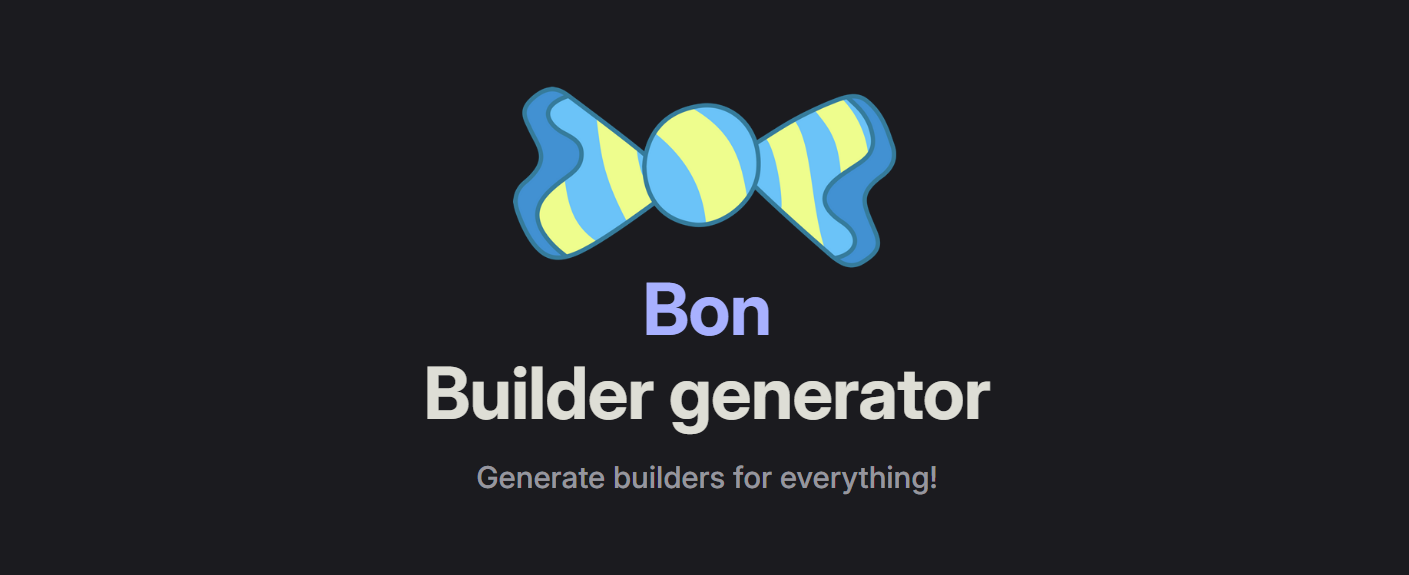
| 📖 Guide Book | Narrative introduction |
| 🔍 API Reference | Attributes API index |
bon is a Rust crate for generating compile-time-checked builders for structs and functions. It also provides idiomatic partial application with optional and named parameters for functions and methods.
If you wonder "Why would I use builders?", see the motivational blog post.
You can turn a function with positional parameters into a function with named parameters with #[builder].
use bon::builder;
#[builder]
fn greet(name: &str, level: Option<u32>) -> String {
let level = level.unwrap_or(0);
format!("Hello {name}! Your level is {level}")
}
let greeting = greet()
.name("Bon")
.level(24) // <- setting `level` is optional, we could omit it
.call();
assert_eq!(greeting, "Hello Bon! Your level is 24");Any syntax for functions is supported including async, fallible, generic functions, impl Trait, etc.
Many things are customizable with additional attributes described in the API reference, but let's see what else bon has to offer.
Use #[derive(Builder)] to generate a builder for a struct.
use bon::Builder;
#[derive(Builder)]
struct User {
name: String,
is_admin: bool,
level: Option<u32>,
}
let user = User::builder()
.name("Bon".to_owned())
// `level` is optional, we could omit it here
.level(24)
// call setters in any order
.is_admin(true)
.build();
assert_eq!(user.name, "Bon");
assert_eq!(user.level, Some(24));
assert!(user.is_admin);Associated methods require #[bon] on top of the impl block additionally.
The method named new generates builder()/build() methods.
use bon::bon;
struct User {
id: u32,
name: String,
}
#[bon]
impl User {
#[builder]
fn new(id: u32, name: String) -> Self {
Self { id, name }
}
}
let user = User::builder()
.id(1)
.name("Bon".to_owned())
.build();
assert_eq!(user.id, 1);
assert_eq!(user.name, "Bon");#[derive(Builder)] on a struct generates builder API that is fully compatible with placing #[builder] on the new() method with a signature similar to the struct's fields (more details on the Compatibility page).
All other methods generate {method_name}()/call() methods.
use bon::bon;
struct Greeter {
name: String,
}
#[bon]
impl Greeter {
#[builder]
fn greet(&self, target: &str, prefix: Option<&str>) -> String {
let prefix = prefix.unwrap_or("INFO");
let name = &self.name;
format!("[{prefix}] {name} says hello to {target}")
}
}
let greeter = Greeter { name: "Bon".to_owned() };
let greeting = greeter
.greet()
.target("the world")
// `prefix` is optional, omitting it is fine
.call();
assert_eq!(greeting, "[INFO] Bon says hello to the world");Methods with or without self are both supported.
Builders generated by bon's macros use the typestate pattern to ensure all required parameters are filled, and the same setters aren't called repeatedly to prevent unintentional overwrites. If something is wrong, a compile error will be created.
| ⭐ Don't forget to give our repo a star on Github ⭐! |
|---|
What you've seen above is the first page of the 📖 Guide Book. If you want to learn more, jump to the Basics section. And remember: knowledge is power 🐱!
Feel free to jump to code and use the #[builder] and #[derive(Builder)] once you've seen enough docs to get started.
The 🔍 API Reference will help you navigate the attributes once you feel comfortable with the basics of bon. Both #[derive(Builder)] on structs and #[builder] on functions/methods have almost identical attributes API, so the documentation for them is common.
Add bon to your Cargo.toml.
[dependencies]
bon = "3.1"You can opt out of std and alloc cargo features with default-features = false for no_std environments.
This project was heavily inspired by such awesome crates as buildstructor, typed-builder and derive_builder. This crate was designed with many lessons learned from them.
See alternatives for comparison.
Some notable users:
If you can't figure something out, consult the docs and maybe use the 🔍 Search bar on our docs website. You may also create an issue or a discussion on the Github repository for help or write us a message on Discord.
| Discord | Here you can leave feedback, ask questions, report bugs, or just write "thank you". |
| X (Twitter) | Profile of the maintainer. There are only posts about bon and Rust in general here. |
Unless you explicitly state otherwise, any contribution intentionally submitted for inclusion in the work by you, as defined in the Apache-2.0 license, shall be dual licensed as above, without any additional terms or conditions.